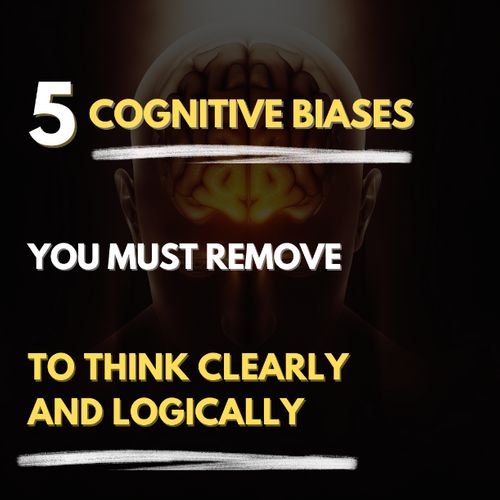5 Cognitive Biases You Must Remove To Think Clearly and Logically ...
Feb 09, 2023 · 4 mins read
0
Share

Biases 1-3
Over the course of our evolution, everyone develops cognitive biases that restrict us from thinking clearly and logically. A cognitive bias is a systematic error in thinking. This is not just an occasional mistake in judgment, but rather a systematic pattern of mistakes.
Save
Share
The brain develops biases because to avoid over extertion and to conserve energy whenever possible. As a result, it relies on generalizations, rules of thumb, and other shortcuts to help think quickly, make fast decisions and simplify the complex world for us.
Save
Share
Nowadays, making well-informed decisions is more important than making quick ones. We may be pushing ourselves towards irrational decisions if we rely on these biases for decision-making. So here are five cognitive biases that hinder our decision-making and how to avoid them.
Save
Share
1. Confirmation Bias:
The mother of all biases, the tendency to interpret new information in a way that fits existing beliefs, theories, and convictions. Following this bias we tend to filter out any new information that contradicts our existing beliefs.

Save
Share
By offering tailored information based on our browsing behavior and previously liked posts, the internet, and social media in particular reinforce views and opinions. Like-minded communities surround us, making it even more difficult to find evidence that contradicts our beliefs.
Save
Share
Solution:
Disprove your darlings; write down your beliefs in terms of worldviews, investments, healthcare, relationships, and career strategies, and set out to find discomforting evidence. It might be uncomfortable for a while but it's a great way to form updated beliefs.
Save
Share
2. Sunk Cost Fallacy:
When someone has put a lot of money, time, or energy into something. This investment becomes the only reason to continue, even if they are dealing with a lost cause. The more they invest, the greater the sunk costs and the greater the desire to continue.

Save
Share
A toxic relationship, a pointless project, or a declining stock. People's need for consistency drives this irrational behavior. They are afraid of losing their credibility and admitting mistakes. So they keep going because it delays the painful realization.
Save
Share
Solution:
Only the assessment of future costs and benefits matters, regardless of how much one has already invested. Consider the project's long-term benefits. If the project was a flop, admit it and move on. Don't try to keep it for the sake of the investment.
Save
Share
3. Self-Serving Bias:
A self-serving bias is when a person takes credit for positive events or outcomes while blaming external factors for negative events. Age, culture, clinical diagnosis, and other factors can all have an impact on this.
Continue in the next part ➡️
Save
Share
0